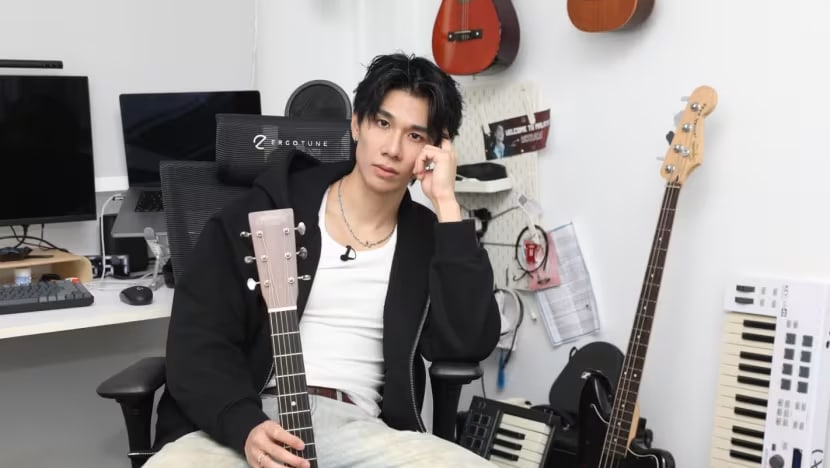He skipped school only to rank 18th in a boy band reality show, but singer-songwriter WhyLucas has no regrets

WhyLucas pictured in a corner of his bedroom which he set up as a studio to work on his music, on May 14, 2025. (Photo: Mak Jia Kee/CNA)

This audio is generated by an AI tool.
In the quiet of his grey-toned childhood bedroom, 22-year-old Lucas Wang tinkered with original music on his laptop then paused to translate in Hokkien as he introduced me to his grandmother.
The second-year business student at the National University of Singapore has slipped back into a familiar rhythm – balancing school and home life with being a singer-songwriter under his stage name, WhyLucas, which is derived from his Chinese name’s initials.
Just a few months ago, his days were a blur of cameras and choreography under blinding stage lights as a finalist on Chuang Asia, a reality competition show filmed in Thailand where he vied for a spot in an international boy group.
Mr Wang competed on the Chinese-Thai show’s second season, which follows the “idol survival show” format popularised by K-Pop.
In such shows trainees mostly in their teens and early twenties battle it out in front of celebrity judges and global audiences. Their rankings shift each week based on performance and popularity.
One episode of Chuang Asia 2 drew more than 700,000 viewers on a livestream and videos of Mr Wang’s performances with fellow contestants have since racked up close to 800,000 views on social media.
Mr Wang, the only Singaporean contestant on the show, did not end up debuting in the seven-member group after ranking 18th out of 21 finalists in the final episode, but said the experience has changed his life. The show began with 60 trainees mostly from China, Thailand and Japan.
“Before going to Chuang, I would (always think), ‘Can I do this?’ But now the way I approach things is, ‘Do I want to do this?’ And if I want to do this, I'm not going to stop until I get something out of it,” said Mr Wang.
Since returning from Thailand, Mr Wang has picked up new fans from around the region, acquired a management team and has been approached to perform at music festivals because of the added exposure.
Being on a reality competition show taught him to push himself musically, after being exposed to the “amazing amount of talent from the world”.
Mr Wang grew up loving 2010s pop music, including the likes of Shawn Mendes, Taylor Swift and Adele. After coming across singer-songwriter John Mayer’s music in 2020, Mr Wang took influence from a more guitar forward, self-produced style of music and wanted to bring a “bluesy rock guitar style” to his own songs.
“I would say the music I’m creating now is still pop. But the kind of pop that feels so experimental but you would still add to your playlist not just because it’s trending, but because of its ageless, catchy melodies, production and guitar-playing,” he said.
Part of training to be a global idol includes learning to greet fans in multiple languages and Mr Wang’s self-introduction in Thai, Malay, Mandarin and English still rolls off his tongue with the ease of muscle memory.
During our interview, he gamely attempted a more localised version in the Hokkien.
Perhaps most Singaporean of all is the way he fumbles with the translation in the Chinese variety before popping out of the room to consult his parents and grandmother.
Moments later, he returns with a big smile and a bit more confidence in his greeting of “Dai gei ho”, saying in Hokkien, “Hi everyone, I’m WhyLucas”.
STANDING OUT SOLO
Having watched a few such shows, I always thought it would be my worst nightmare having to endure being openly ranked against other talented contestants day in and out.
When I saw WhyLucas' first solo performance on the show, I pegged him as someone who must be my polar opposite, or at the very least not nearly as self-conscious or anxious about public critique.
After all, there he stood in a muscle tank, playing electric guitar and singing his original song to a pool of professional singers and celebrity judges – a clip of which has 44,000 views on YouTube.
It turned out that Mr Wang has plenty of doubts of his own.
During our weekday afternoon chat at his home, he said he was conflicted after receiving a direct message from the show’s casting agency in June last year, given that the opportunity was far out of his comfort zone.
A friend told him that the programme was “really famous” in China and convinced him to audition for it.
Following an online then offline audition, Mr Wang flew to Thailand to prepare for filming by November, which lasted till April this year.
Mr Wang is no stranger to being in the limelight as he has spent two years busking at the most lucrative corners of Orchard Road.
Aided by that experience, he quickly immersed himself in the competition process which included almost 24/7 filming of his daily life.
Each day included round-the-clock filming of their living quarters via CCTV, plus six to eight hours of practice with the remaining hours packed with filming of reality content, advertisements and marketing for the programme.
He also had to work in a multilingual environment, though his fluency in Mandarin and English enabled him to play translator in group projects with other contestants.
“When I first came in the programme, I was definitely a little bit intimidated, because I saw a lot of China trainees who felt very professional, and they looked like they knew how to dance, but I just didn't know,” said Mr Wang.
Besides being able to dance, some trainees were also familiar with the reality competition format, including how to circumvent filming restrictions such as having to surrender one's mobile phone, he said.
“Most people brought extra phones. But for me, I was actually very naive. I was like, I'm not gonna bring my phone, I got to focus. Then when I went there, everybody brought phones. Some people brought tablets, someone even brought five phones,” he said with a laugh.
Unlike other contestants, Mr Wang did not have a management team helping him garner votes but became popular among other contestants and drew fans from all around Asia.
One highlight was the first meeting between contestants, where each trainee got three stickers to place on other contestants with whom they would like to work.
Mr Wang, the only Singaporean, managed to get the most stickers from the other trainees after his solo performance.
“Along the way, I felt like because I came from a busking and singer-songwriter background, I stood out a bit more and that let me be a bit more confident in being the person I am,” he said.












